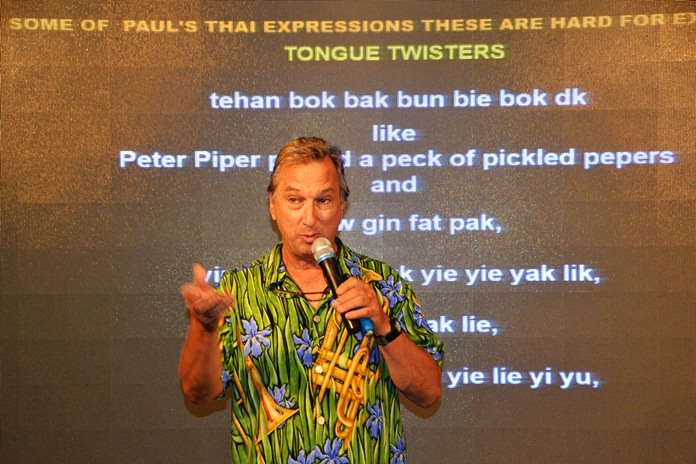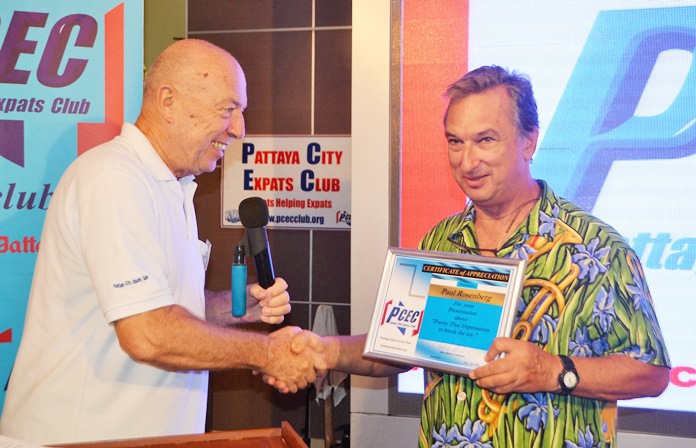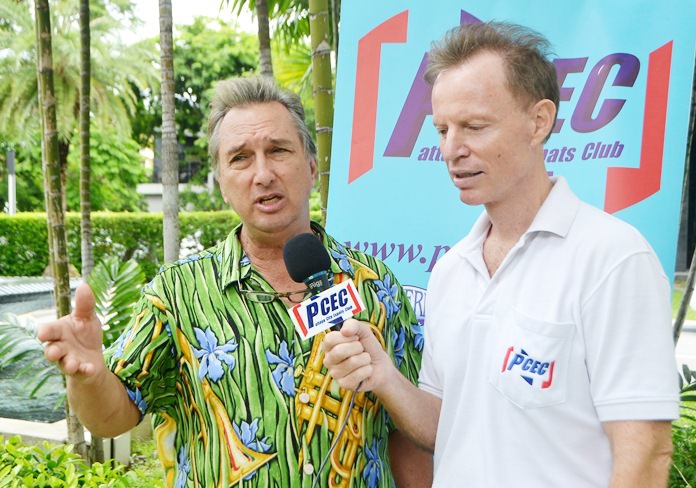Learning Thai expressions and proverbs was the program at the Sunday, July 10, meeting of the Pattaya City Expats Club. It was a double feature presentation. First up was Paul Rosenberg whose topic was Funny Thai Expressions to Break the Ice. He was followed by club member Ren Lexander who commented on Thai proverbs, while different from those most of the audience grew up with, had the same or very similar meaning. Paul Rosenberg previously spoke to the PCEC in April last year about quad helicopters and other remote controlled aircraft. Club member Ren Lexander has made several interesting presentations on various topics.

Paul said that although he speaks some languages other than English, he never managed to learn to speak Thai per se, but he has picked up a number of Thai expressions which, he feels, can help foreigners (farang) to break the ice when they meet a Thai person. The transliterations in this article are those that Paul provided; as most expats are aware, there are several different transliterations in use for Thai words when spelled using the Roman alphabet.
Although not expressions, he started with some Thai tongue twisters, such as: tehan bok bak bun bie bok dk and sow san swie sie suwa si san suwam, sun soong sigh sie soy sam sip son sen. Try saying either of those quickly a few times in a row! Paul didn’t say what they meant, just that they were Thai tongue twisters such as our well known English version of Peter Piper picked a peck of pickled peppers; also very difficult to say quickly in English.

Using a Thai tongue twister might get you a few laughs, Paul said, but Thais are usually more impressed if you can say a few simple phrases that most farang would not normally know. Further, some of the expressions he used can be humorous, such as dohk chie mak luie; kun narak joong buey which means Oh my God, you are so cute. Others are more like slang – for example: sabie di sow sow, which means What’s up, girls or if addressing boys, you’d say sabie di noom noom. Per Paul, both of these are Isan phrases.

Paul said that if something has exasperated you and you are mumbling to yourself, This is Thailand! you can say out loud in Thai, ja tam yung ie di – tam jie – moht ban ya, which, collectively, means That’s life. What can I do? I give up. I am at my wits end. Additionally, if you can’t pay for something, Paul said, you can try saying pom at ja gap ma prung nee, pom gap nun, which means I come back tomorrow with money. Maybe.
Many farang use the word aroi or the phrase aroi mak in a restaurant to describe delicious food. Paul provided several additional phrases which mean the same thing and might be more impressive to the Thai recipient: sep wur, sep kat bo, toy jang who, lam de de. He suggests you try one of these phrases the next time you dine out. In concluding his presentation, Paul mentioned that he picked up the phrase took dong la kap from watching a Jeopardy game show in Bangkok; it means You are correct!

Ren Lexander then talked about Thai proverbs. He said that he became interested in Thai proverbs when he found that some English proverbs have no equivalent in Thai, e.g., if you try to say Killing the goose that laid the golden egg in a literal translation into Thai, Thai people have no idea what you mean.
However, he found that often proverbs in one language have an equivalent in the other language, even if they use different images. For example, Ren said, there is a Thai expression which literally translates as Catch two fish in two hands. The English proverb that is roughly equivalent, is A bird in the hand is worth two in the bush. Another example is the Thai saying In a town where people wink, you must also wink, which has an equivalent English expression of When in Rome, do as the Romans do.

Some other examples of Thai proverbs and their English equivalent he mentioned are: (Thai) Run away from a tiger and into a crocodile, (English) Out of the frying pan into the fire; (Thai) To bathe in hot water before others, (English) To have more experience; (Thai) Old cow likes to eat fresh grass, (English) Old men like young girls, and (Thai) Love the older sister, but yearn for the younger one, (English) The grass is always greener on the other side.
Some of the sayings mentioned by Ren along with many more can be found on this website: http://www.speakrealthai.com/sayings.html .
After the presentation, MC Roy Albiston brought everyone up to date on upcoming events and called on Ira Wettenstein to conduct the Open Forum, where questions are asked and answered about expat living in Thailand, especially Pattaya. For more information on the PCEC’s many activities, visit their website at www.pcecclub.org.




